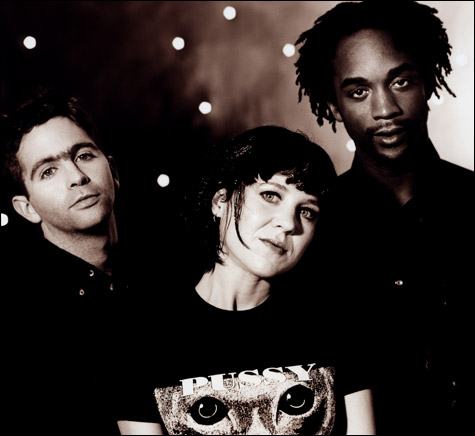
BREAKING UP IS HARD TO DO: "I want it to make sense for the Muses to be over," says Hersh (here with Narcizo and Georges). "But it doesn't! It's too good and I love the band too much." |
When we listen to a song, whether it's an old favorite or a new sound, we rarely consider the circuitous path that the tune has taken to reach our ears — winding its way through the slippery fingers of the writer, coursing through the often electrified veins of the performer, all the while serving as the lifeblood of a massive global industry. Yet despite the distance and time and interference of the biz, we keep coming back, as deep down we all connect to the art of songwriting. For Kristin Hersh, it doesn't matter whether she's writing material for her beloved Throwing Muses (who come to the Middle East downstairs this Saturday, with long-time members David Narcizo on drums and Bernard Georges on bass), for her solo act, or for her more recent foray into noise rock, 50 Foot Wave: songwriting isn't a creative process so much as an exorcism, and one that has often had her speaking in tongues."The songs I've written needed to be spoken, but they speak in such a strange language," she tells me. "In some ways, I'm still confused that anyone ever listens."
She's being modest, of course. Hersh has sustained a rabid following ever since the Muses' mid-'80s heyday, when they went from a local rock sensation to a global underground phenomenon. (They were the first American band signed to prestigious UK label 4AD.) Hersh formed Throwing Muses in her home town of Newport, Rhode Island, in 1981, at the age of 14, and the band — whose line-up included her half-sister, an equally young Tanya Donelly (see "You're the Inspiration," below) — congealed into a swirling mass of gritty guitars, off-kilter percussion, and Hersh's distinctively unhinged vocal delivery.
Thinking back on those early days, Hersh reflects that "the idiosyncratic nature of what I was doing made a lot of people call me 'crazy' and call the music 'crazy.' But you know, we were very much living on our own planet — or at least, I was. I didn't mean to write songs, I heard them and copied them down, and I would burn with their energy until they were recorded and played live and I could give them away to other people. I was truly an obsessive when it came to what we did — and there's a fine line between obsessive and . . . retarded."
If she sounds a bit hard on herself, that could be because her journey as a songwriter has been long and arduous, filled with major-label tussles and the Muses' constant cycle of break-up and re-formation.
"The Throwing Muses, as an entity, feels very alive. There have been moments when I have thought, 'It's so sad, we're zombies, we're the walking dead!' But then we'll get back together, like we did recently to tour Australia, and it's incredible — and I don't want it to be incredible because I want it to make sense for the Muses to be over. But it doesn't make sense! It's too good, and I love the band too much. I'm keeping it alive, and I'm trying not to think about zombies."
Hersh's zombiephobia must stem in part from her experience with the major-label wringer of the '90s, when the Muses' American label, Sire, told the band to become more commercial or they'd be dropped. For Hersh, the choice was painful but inevitable. "We never broke up, but we just decided not to suck. Imagine any other career where you would be asked to dumb down what you did! It would be like asking a firefighter, 'Put out fewer fires.' It was confusing and disappointing, and ultimately we ran out of money to be on the road or in the studio — which is really what a working band is."
Today, Hersh is the epitome of a working musician: she splits her time among Muses resurgences, 50 Foot Wave, and her solo career, all while eking out a living far from record-label subservience. She's a co-founder of CASH Music, a non-profit organization that releases label-less music both free and via donations and subscriptions on the Web; her first full-length to emerge from this project will be a solo record, Speedbath, later this year. Does she worry that, in the words of Spinal Tap manager Ian Faith, her "appeal is becoming more . . . selective"?
"Well, I think that when I was successful according to the Warner Bros. definition of success, the end result was that a lot of people who wouldn't normally listen to my music were fooled into buying my records. The people who believe that what's going on in the entertainment industry is what's going on in art are false friends who don't stick around. What I was left with aren't fans but actual listeners who understand the work and who don't buy into the church of the rock star. It's more work, but in the end I really believe that style should not win out over substance — ever."
THROWING MUSES + SCREAMING FEMALES + 50 FOOT WAVE | Middle East downstairs, 480 Mass Ave, Cambridge | March 14 at 9 pm | $12 | 617.864.EAST orwww.mideastclub.com